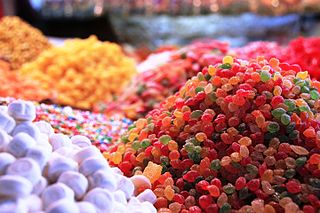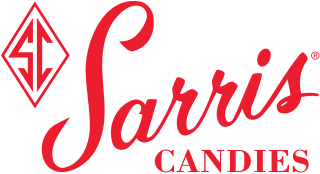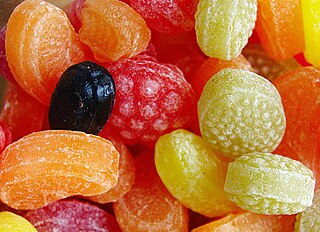Related Research Articles

Candy, also called sweets or lollies, is a confection that features sugar as a principal ingredient. The category, called sugar confectionery, encompasses any sweet confection, including chocolate, chewing gum, and sugar candy. Vegetables, fruit, or nuts which have been glazed and coated with sugar are said to be candied.

The Slinky is a precompressed helical spring toy invented by Richard T. James in the early 1940s. It can perform a number of tricks, including travelling down a flight of steps end-over-end as it stretches and re-forms itself with the aid of gravity and its own momentum, or appear to levitate for a period of time after it has been dropped. These interesting characteristics have contributed to its success as a toy in its home country of the United States, resulting in many popular toys with slinky components in a wide range of countries.

Blythe is a fashion doll, about 28 cm (11 inch) tall, with an oversized head and large eyes that change color with the pull of a string. It was created in 1972 and was initially only sold for one year in the United States by toy company Kenner. In 2001 the Japanese toy company Takara began producing new editions of Blythe dolls. There is a network of hobbyists who customize the doll for resale and create clothing and shoes for Blythe. Enthusiasts share photographs of their work and other types of dolls on the Internet.

A Christmas decoration is any of several types of ornamentation used at Christmastide and the greater holiday season. The traditional colors of Christmas are pine green (evergreen), snow white, and heart red. Gold and silver are also very common, as are other metallic colours. Typical images on Christmas decorations include Baby Jesus, Father Christmas, Santa Claus, and the star of Bethlehem.

Sarris Candies, Inc., is a specialty chocolate and candies company based in Canonsburg, Pennsylvania, approximately 18 miles (29 km) southwest of Pittsburgh. It was founded in 1960 by Frank Sarris.
Santa's Candy Castle, located in Santa Claus, Indiana, is a tourist attraction that uses the traditions and decorations from Christmas as its theme.

Littlest Pet Shop is a toy franchise and cartoon series owned by Hasbro. The original toy series was produced by Kenner in the early 1990s. An animated television series was made in 1995 by Sunbow Productions and Jean Chalopin Creativite et Developpement, based on the franchise.

Army men, or plastic soldiers, are toy soldiers that are about 5 cm (2.0 in) tall and most commonly molded from olive green, relatively unbreakable plastic. Unlike the more expensive toy soldiers available in hobby shops, army men are sold at low prices in discount stores and supermarkets in bulk packaging. Army men are traditionally green and almost always dressed in modern military uniforms and armed with 20th-century weapons. 'Jumbo' army men are a less common secondary scale with 4.75-inch (12.1 cm) soldiers made with the same process.

Pinocchio's Daring Journey is a dark ride at Disneyland in California, Tokyo Disneyland, and Disneyland Park in Paris. Located in the Fantasyland section of each park, this ride is based on Disney's 1940 animated film version of the classic story, which was the studio's second animated feature film. The attraction tells an abbreviated version of the film, with Pinocchio escaping from Stromboli's puppet show and visiting Pleasure Island, ignoring Jiminy Cricket's advice. Monstro the whale makes an appearance, and Pinocchio is finally reunited with Geppetto and turned into a real boy.

Barley sugar is a traditional variety of boiled sweet, often yellow or orange in colour, which is usually made with an extract of barley, giving it a characteristic taste and colour. It is usually sold in the shape of twisted sticks. Barley sugar is very similar to clear toy candy and to hard caramel candy in its texture and taste.

Topper Corporation was a United States toy and board game manufacturer based in Elizabeth, New Jersey. The company, founded and run by Henry Orenstein, a holocaust survivor, produced toys under several brand names including: Johnny Lightning, Johnny Seven OMA, Dawn doll, and Suzy Homemaker.
The Westmoreland Glass Company was a company that produced glass in Grapeville, Pennsylvania.

Machine Robo Mugenbine (マシンロボムゲンバイン), also called Multiple General Node Combine System or Mu.Gen.Bine is a Japanese transforming robot toyline first released on 27 December 2003 by Bandai. Designed by PLEX, Mugenbine is the successor of the Machine Robo line of transforming toy robots.
Resin casting is a method of plastic casting where a mold is filled with a liquid synthetic resin, which then hardens. It is primarily used for small-scale production like industrial prototypes and dentistry. It can be done by amateur hobbyists with little initial investment, and is used in the production of collectible toys, models and figures, as well as small-scale jewellery production.
Prizes are promotional items—small toys, games, trading cards, collectables, and other small items of nominal value—found in packages of brand-name retail products that are included in the price of the product with the intent to boost sales, similar to toys in kid's meals. Collectable prizes produced in series are used extensively—as a loyalty marketing program—in food, drink, and other retail products to increase sales through repeat purchases from collectors. Prizes have been distributed through bread, candy, cereal, cheese, chips, crackers, laundry detergent, margarine, popcorn, and soft drinks. The types of prizes have included comics, fortunes, jokes, key rings, magic tricks, models, pin-back buttons, plastic mini-spoons, puzzles, riddles, stickers, temporary tattoos, tazos, trade cards, trading cards, and small toys. Prizes are sometimes referred to as "in-pack" premiums, although historically the word "premium" has been used to denote an item that is not packaged with the product and requires a proof of purchase and/or a small additional payment to cover shipping and/or handling charges.

A hard candy, or boiled sweet, is a sugar candy prepared from one or more sugar-based syrups that is heated to a temperature of 160 °C (320 °F) to make candy. Among the many hard candy varieties are stick candy such as the candy cane, lollipops, rock, aniseed twists, and bêtises de Cambrai. "Boiled" is a misnomer, as sucrose melts fully at approximately 186 °C. Further heating breaks it into glucose and fructose molecules before it can vaporize.

Shane Confectionery is an American candy shop and candy producer, located at 110 Market Street in Philadelphia, Pennsylvania. Currently owned by Ryan and Eric Berley, it is considered the longest-running confectionery business in the United States. The original confectionery business at the location opened in 1863. They are known for making traditional specialties including previous owner Edward Shane's buttercream chocolates and Pennsylvania clear toy candy.

Clear toy candy is a traditional confectionery that originated in Germany, England and Scotland. It is especially popular at Easter and Christmas. The hard candy is made in molds, in a multitude of fanciful shapes. The candy is tinted in bright colors, traditionally yellow, red and green. A stick is sometimes added before the candy completely cools to make a lollipop.
Nosco Plastics, Inc. was the plastics molding division of National Organ Supply Company created in 1934 to make plastic parts for electric organs and was located at 1701 Gaskell Avenue, Erie, Pennsylvania, 16503. Beginning in 1948 with the implementation of the newly developed screw injection molding process, NOSCO quickly became a major early producer of tiny plastic toys called "slum" sold to wholesalers as carnival merchandise, used by the millions as prizes in packages of Cracker Jack popcorn confection, and mail-order flats that were heavily advertised in American comic books as "100 Toy Soldiers for $1" by E. Joseph Cossman & Company. NOSCO also held a number of patents on plastic molded products including mechanical toys, storage containers, pallets, and medical syringes.
References
- 1 2 Insiders' Guide to Pennsylvania Dutch Country by Marilyn Odesser-Torpey pages 126, 127
- ↑ "Regennas Clear Toys". Candy Blog. 2006-12-18. Retrieved 2014-04-20.